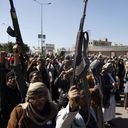What to know about Yemen's Houthi rebels and the Red Sea conflict

The Biden administration has re-designated the Houthi rebels as a foreign terrorist organization after multiple attacks by the militant group on ships in the Red Sea.
Why it matters: The recent escalation in the Red Sea and the growing U.S. military involvement comes amid fears that tensions heightened by the Israel-Hamas war could boil over into a larger regional conflict.
- The U.S. and U.K. carried out airstrikes against the Iran-backed Houthis last week in response to dozens of attacks on merchant and commercial vessels in the Red Sea.
The big picture: The move to re-designate the Houthis undoes one of President Biden's first foreign policy decisions after assuming office in 2021.
- His administration swiftly retracted the Trump administration's last-minute Foreign Terrorist Organization designation against the Houthis.
- The Biden administration had done so out of concern that the designation would hamper humanitarian relief efforts in Yemen.
- When asked more recently if he would be willing to call the Houthis a terrorist group, Biden said: "I think they are."
Why are Houthi rebels attacking Red Sea ships?
The Houthis have said their attacks are in retaliation for Israel's ongoing military operation in Gaza, and claimed to be targeting vessels either owned by Israeli companies or en route to Israel.
- However, some of the ships targeted by the Houthis have had no affiliation with Israel.
- The attacks have severely disrupted international shipping, with multiple companies temporarily halting transits through the Red Sea, which leads to the Suez Canal — one of the world's most important maritime choke points.
- The disruptions have caused a surge in shipping rates that could translate into an increase in prices, delays in manufacturing and other economic consequences.
Why are the U.S. and U.K. bombing the Houthis?
In response to the attacks, the U.S. launched a multinational maritime security force to protect ships passing through the Red Sea.
- The strikes, which involved precision-guided munitions launched from warships and submarines, came a day after the United Nations Security Council adopted a resolution demanding that the Houthis halt their attacks.
- U.S. and coalition forces targeted 16 Houthi militant locations with more than 100 strikes, seeking to destroy command and control nodes, munitions, depots, launching systems, production facilities and air defense radar systems, the Department of Defense said.
- The U.S. in recent weeks has also thwarted several Houthi missile and drone attacks against its warships.
Who are the Houthis?
The Houthis are a political and military organization which came to international attention in 2014 when its fighters overthrew Yemen's internationally recognized government.
- The rebels currently controls Sanaa, the capital, and a large swath of Western Yemen.
- The group emerged in the early 1990s from a religious revival movement around Zaydism, a sect of Shia Islam that roughly 35% of Yemen's population follows.
- It steadily organized and became a formidable opposition faction against Yemen's Sunni-majority, Saudi-backed government
- The movement also became strongly opposed to Israel and to U.S. influence in the the Middle East, ideologically aligning itself with Iran-backed groups like Hezbollah in Lebanon and Hamas in the Gaza Strip.
How did the Houthis become a military power?
Houthi opposition to Yemen's government came to a head in 2004, when Yemen's government attempted to arrest its leader and namesake Hussein al-Houthi for organizing anti-government demonstrations. The group responded by attacking Yemeni security forces.
- Though Hussein al-Houthi was eventually captured and executed by Yemeni security forces during the 2004 conflict, the Houthis would launch five additional guerrilla wars under new leadership while gaining new recruits and expanding its operations within Yemen and conducting raids into neighboring Saudi Arabia.
- Underpinning the long-running conflict was deep political unrest by a feeble economy and corruption allegations against the government.
What role have they had in the Yemeni civil war?
The yearslong insurgency and political unrest would culminate with the Houthis pushing the Yemeni government out of Sanaa in 2014 and also seizing the secondary capital of Aden in 2015.
- At the request of the Yemeni government, a Saudi-led coalition of Gulf states began launching airstrikes in March 2015 against the Houthis, who would eventually begin receiving military support from Iran. The U.S. provided logistical and material support to the Saudi-led war effort.
- The civil and proxy war between the Saudi-backed government and the Iran-backed Houthis spawned one of the world's worst humanitarian crises.
- While the civil war has greatly slowed in recent years, the Houthi rebels and the Saudi-backed Yemeni government have yet to officially make peace.
- The Biden administration announced an end to U.S. support for Saudi-led offensives in Yemen in 2021.
Go deeper: Amid Gaza war, regional escalation draws U.S. deeper into Middle East crisis
Editor's note: This story has been updated with details about the Biden administration re-designating the Houthis as a terrorist group.